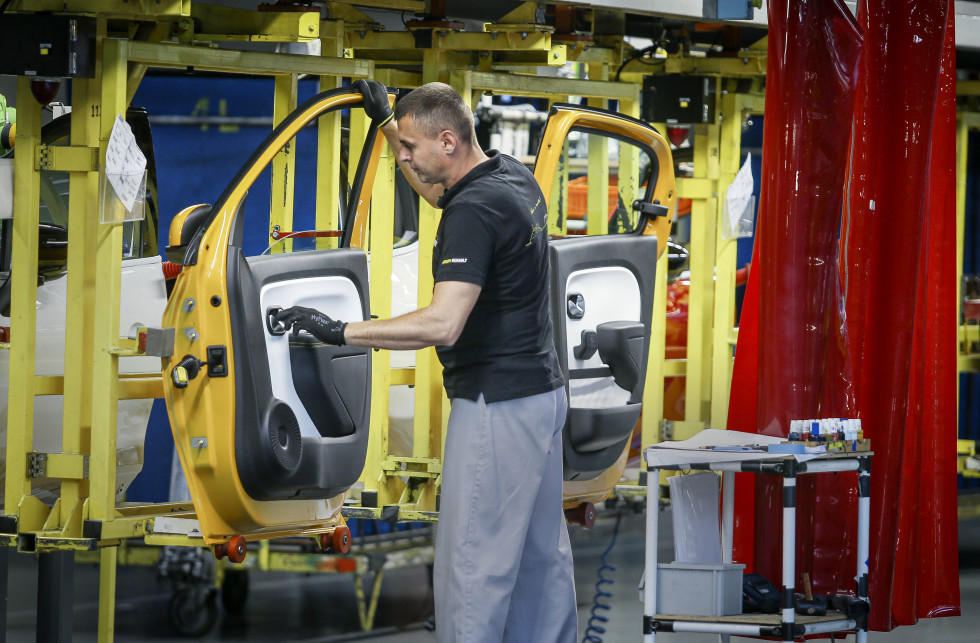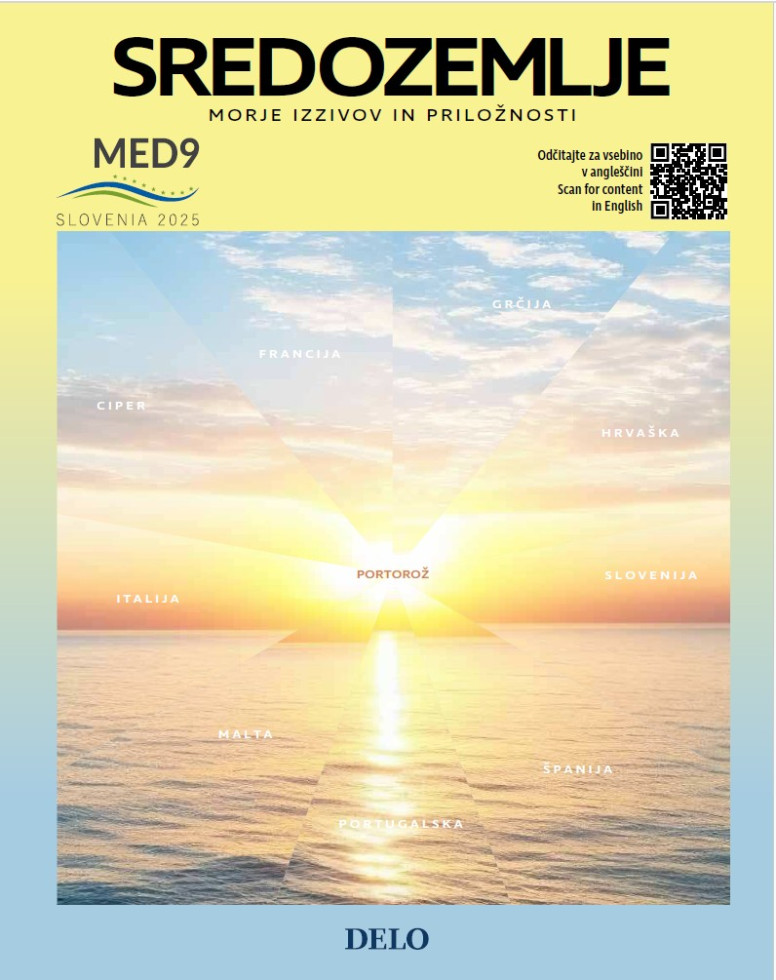A third of Slovenia's exports go to the Mediterranean region
Excluding Switzerland, which is statistically Slovenia's largest trading partner by virtue of Novartis's pharmaceutical logistics, the most important export markets for Slovenian companies are Germany, Croatia, Italy, Austria and France. Three of these top five countries belong to the MED9 group: Croatia is Slovenia's second most important export market, Italy the third, and France the fifth. Spain ranks ten places lower.
"The MED9 group represents around a third of EU member states and almost half of the EU population, making it a significant pool of business opportunities for Slovenian companies," said SPIRIT Slovenia, the public agency that supports companies with their internationalisation efforts. According to the Bank of Slovenia’s trade balance data, trade in goods between Slovenia and the other eight MED9 countries amounted to EUR 23.4 billion last year. This accounts for just over one third of Slovenia's total trade in goods with the EU. Slovenia generates a trade surplus with these Mediterranean partners, exporting more (EUR 1.23 billion) than it imports (EUR 1.1 billion).
SPIRIT Slovenia highlights significant opportunities for strengthening exports to Mediterranean countries in renewable energy, energy efficiency, and sustainable construction – the green transition being a priority of Slovenia's MED9 Presidency – as well as in pharmaceuticals and biotechnology, digital solutions, food processing, logistics and mobility, and high-tech solutions such as space technologies.
Italy: market entry requires local agents
The MED9 group is therefore an important economic market for Slovenian businesses, however, the importance of individual countries varies considerably.
Although Slovenia generates around EUR 10 billion in goods trade with Italy, exports to its western neighbour decreased from a record high of EUR 5.6 billion in 2022 to EUR 4.4 billion last year. This decline is largely due to inflation and high electricity prices, with exports of electricity to Italy plummeting from over a billion euros during the 2022 energy crisis to just a third of that figure last year. Exports of oil and petroleum products also fell by a quarter of a billion euros over two years.
Italy is an extremely important economic market for Slovenian companies, particularly those in the north of the country, such as in Friuli-Venezia Giulia and the industrial region of Lombardy. These regions account for 80–90% of Slovenia's exports to Italy, explained Marko Jare of the International Relations Department at the Chamber of Commerce and Industry of Slovenia (CCIS).
According to him, Italy is a suitable market for exporting a wide range of products, including foodstuffs, consumer goods, components for finished products, industrial machinery and software. However, companies can only enter this market through local agents, who are trained and licensed to connect them with Italian buyers. "Companies have tried to enter the market without agents, but they have not succeeded. Italy is so vast that even Italian companies operating in distant parts of the country partner with agents. If a company operates in multiple regions, it makes sense to work with multiple agents," he said. This autumn, the CCIS will assist companies in finding agents at a Milan forum for the 12th consecutive year.
The Cross-Border Economic Association also supports companies doing business in the Italian market, particularly with regard to cross-border services such as transport.
Croatia: a key market for Slovenian investors
Compared to Italy, exports to Croatia have grown steadily from EUR 2.9 billion in 2019 to EUR 4.7 billion last year. Key exports include road vehicles, electricity from the Krško nuclear power plant, pharmaceuticals, foodstuffs and electrical appliances. Slovenia generates a trade surplus with Croatia of almost EUR 2 billion. However, it should be noted that Croatian companies hold significant ownership stakes in Slovenian food chains. For example, Mplus, a Croatian company, owns a majority stake in Panvita; Podravka owns Žito; Atlantic Grupa has acquired Droga Kolinska; and Fortenova is increasingly centralising Mercator’s management in Zagreb. The Croatian retail chain Studenac, which is backed by a Polish fund, has purchased Kea stores and continues to expand in Slovenia.
Croatia is Slovenia's fifth most important foreign investor, accounting for approximately 7.7% of all inward foreign direct investment at the end of the last year. Conversely, Slovenia's southern neighbour is the most important market for Slovenian investors, accounting for 35.6% of all Slovenian foreign direct investment abroad last year. Half of these investments constituted real estate purchases by Slovenian households, whereas Slovenian legal entities primarily invest in Croatian companies that are active in trade, vehicle maintenance and repair, and manufacturing.
Twingo to boost trade with France
Although France is not among Slovenia's top five foreign investors, it owns one of the country's most significant factories: Revoz. The Slovenian Government has agreed with Renault to support the launch of electric Twingo production in Novo Mesto, which is expected to enter the market early next year. Analysts predict that this will further strengthen Slovenia's economic activity.
Slovenia also generates a significant trade surplus with France. Exports to France reached EUR 1.9 billion last year, and further significant export growth is expected next year due to the electric Twingo production.
Renovating service stations in Malta
Exports to Spain reached just over EUR 800 million last year, primarily driven by Slovenian suppliers to the automotive industry, explained Vanja Bele from the International Relations Department at the Chamber of Commerce and Industry of Slovenia. Other markets, such as Portugal, Greece, Malta and Cyprus, are less important for the Slovenian economy. Although the Slovenian automotive cluster connects with its Portuguese counterpart, business with this geographically distant Atlantic country remains limited. Trade with Greece is slightly stronger, but interest is low even for this Mediterranean partner. Ms Bele notes that the situation is similar for the island of Malta and Cyprus, where business operations by Slovenian companies are still the exception. One example of this is the renovation of service stations in Malta, which was carried out by Hoffmann, a family-owned company from Maribor.
These countries are more distant from Slovenia in terms of both geography and culture than Croatia or Italy, for example. They also have smaller economies than France and more service-oriented than industrial, which leads to less synergy with Slovenia's export-driven industrial sector.
Nevertheless, SPIRIT Slovenia believes that there is still significant potential for expansion into these markets, mentioning participation in the EU research and development projects as an opportunity: "Mediterranean countries are very active in research and innovation, which provides Slovenian companies with opportunities to participate in joint projects and exchange knowledge."
According to them, special emphasis should be placed on niche markets, such as sustainable tourism, premium food products, advanced digital solutions and high technology. "In these segments, Slovenian companies can leverage their competitive advantages and stand out in Mediterranean markets. To ensure long-term success, it is crucial to actively seek partnerships with Mediterranean companies and institutions, invest in innovation and sustainable development, and adapt business models to local conditions."





